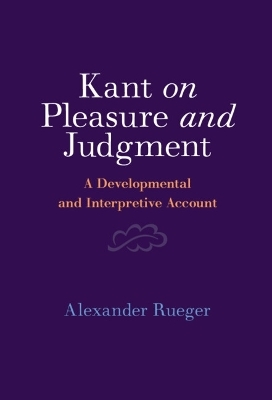
Kant on Pleasure and Judgment
Cambridge University Press (Verlag)
978-1-009-38034-8 (ISBN)
Were there interactions between the development of Kant's aesthetics and the development of his moral philosophy? How did Kant view pleasure and displeasure and what role did they play in the formation of his system of the faculties? In this book, Alexander Rueger situates Kant's account of pleasure and displeasure in its eighteenth-century context, with special attention to Leibniz, Wolff, Crusius, and Mendelssohn. He traces the development of Kant's views on pleasure from the 1770s to his Critique of Aesthetic Judgment in 1790, and shows that throughout, Kant understood pleasure as the satisfaction of faculty interests. The significance of this theory for the completion of Kant's critical system in the third Critique is discussed in detail. Rueger's study illuminates both the role of pleasure and displeasure in Kant's thought, and their important connections to the power of judgment.
Alexander Rueger is Professor Emeritus in the Department of Philosophy at the University of Alberta. He has published widely in the history and philosophy of science and on Kant's aesthetics.
Introduction; 1. The early reception of the third Critique; 2. The completion of the system of the powers of the mind, 1770–1790; 3. Kant's theory of the feeling of pleasure and displeasure (I); 4. Kant's theory of the feeling of pleasure and displeasure (II); 5. Consequences of the theory; 6. The principle(s) of the reflecting power of judgment; 7. The interest of the reflecting power of judgment and the deduction of judgments of taste; 8. The imagination in its freedom; 9. The transition from nature to freedom; Conclusion: the autonomy of taste; Bibliography; Index.
| Erscheinungsdatum | 29.03.2024 |
|---|---|
| Zusatzinfo | Worked examples or Exercises |
| Verlagsort | Cambridge |
| Sprache | englisch |
| Maße | 152 x 229 mm |
| Gewicht | 495 g |
| Themenwelt | Geisteswissenschaften ► Philosophie ► Erkenntnistheorie / Wissenschaftstheorie |
| Geisteswissenschaften ► Philosophie ► Philosophie der Neuzeit | |
| ISBN-10 | 1-009-38034-6 / 1009380346 |
| ISBN-13 | 978-1-009-38034-8 / 9781009380348 |
| Zustand | Neuware |
| Informationen gemäß Produktsicherheitsverordnung (GPSR) | |
| Haben Sie eine Frage zum Produkt? |
aus dem Bereich

![Was heißt Denken?. Vorlesung Wintersemester 1951/52. [Was bedeutet das alles?] - Martin Heidegger](/media/113619842)
